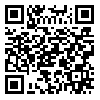Volume 8, Issue 1 (8-2020)
jmsthums 2020, 8(1): 60-69 |
Back to browse issues page
Download citation:
BibTeX | RIS | EndNote | Medlars | ProCite | Reference Manager | RefWorks
Send citation to:



BibTeX | RIS | EndNote | Medlars | ProCite | Reference Manager | RefWorks
Send citation to:
B H, A A A, A D. Frequency and Antibiotic Resistance pattern of Uropathogenic Bacteria Isolated from Urine Samples in Kalaleh, North-East Iran. jmsthums 2020; 8 (1) :60-69
URL: http://jms.thums.ac.ir/article-1-787-en.html
URL: http://jms.thums.ac.ir/article-1-787-en.html
1- Department of Microbiology, Gorgan Branch, Islamic Azad University, Gorgan, Iran
2- Infectious Diseases Research Center, Golestan University of Medical Sciences, Gorgan, Iran
2- Infectious Diseases Research Center, Golestan University of Medical Sciences, Gorgan, Iran
Abstract: (5673 Views)
Background & Aim: Urinary tract infection (UTI) is one of the most common bacterial infections that are usually treated empirically. Since antibiotic resistance may vary from region to region, the aim of this study was to determine the prevalence and antibiotic resistance of uropathogenic bacteria isolated from urine samples received by the local hospital in Kalaleh (Hazrat Rasool hospital), northeastern part of Golestan province.
Methods: From July through September 2017, all urine samples received by the clinical laboratory at the Hazrat Rasool were analyzed for UTI. Among positive samples, uropathogenic bacteria were identified by microbiological and biochemical tests and the antibiotic resistance patterns were determined by disk diffusion method.
Results: Out of 640 urine samples, 141 samples (22%) were positive for UTI. The isolates were as follows: Staphylococcus epidermidis, Escherichia coli, Klebsiella pneumoniae, Staphylococcus saprophyticus, Enterobacter cloacae, Micococcus sp., group B Streptococcus and Pseudomonas aeruginosa. Gram positive and Gram-negative isolates showed the highest resistance to tetracycline (71.4%) and cephalotin (85.9%), respectively. The isolates had the highest antibiotic susceptibility to nitrofurantoin (91.4%).
Conclusion: In our sample, the most common causes of UTI were E. coli and S. saprophyticus. Both of these bacterial agents showed highest resistance to tetracycline. Based on our findings, nitrofurantoin and amikacin could be recommended for treating UTI as the best first-choice drug.
Methods: From July through September 2017, all urine samples received by the clinical laboratory at the Hazrat Rasool were analyzed for UTI. Among positive samples, uropathogenic bacteria were identified by microbiological and biochemical tests and the antibiotic resistance patterns were determined by disk diffusion method.
Results: Out of 640 urine samples, 141 samples (22%) were positive for UTI. The isolates were as follows: Staphylococcus epidermidis, Escherichia coli, Klebsiella pneumoniae, Staphylococcus saprophyticus, Enterobacter cloacae, Micococcus sp., group B Streptococcus and Pseudomonas aeruginosa. Gram positive and Gram-negative isolates showed the highest resistance to tetracycline (71.4%) and cephalotin (85.9%), respectively. The isolates had the highest antibiotic susceptibility to nitrofurantoin (91.4%).
Conclusion: In our sample, the most common causes of UTI were E. coli and S. saprophyticus. Both of these bacterial agents showed highest resistance to tetracycline. Based on our findings, nitrofurantoin and amikacin could be recommended for treating UTI as the best first-choice drug.
Type of Study: Research |
Subject:
Special
Received: 2020/05/22 | Accepted: 2020/08/1 | Published: 2020/09/19
Received: 2020/05/22 | Accepted: 2020/08/1 | Published: 2020/09/19
Send email to the article author
| Rights and permissions | |
 | This work is licensed under a Creative Commons Attribution-NonCommercial 4.0 International License. |






